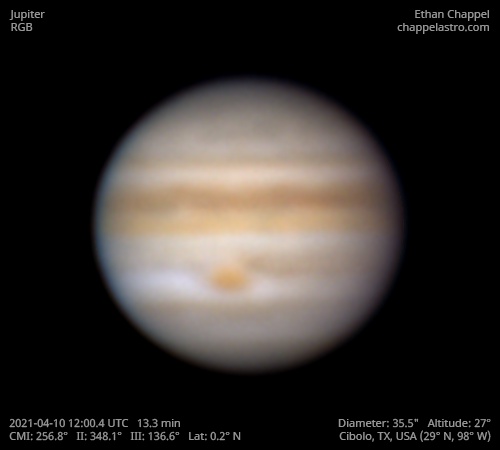
Jupiter UTC
CM1: 256.80°
CM2: 348.10°
CM3: 136.60°
CLat: +0.20°
Description
Although Jupiter has been visible in the morning sky for a while now, the wait for clear weather has finally ended. As the sky brightened, it was breezy and the air above was very turbulent. This was my first time having insulation wrapped around the OTA while imaging a planet. Despite having just bringing the scope out to a cooler environment, I saw no internal heat plume while collimating the secondary mirror.
This was also the first time I used my Chroma extended green filter on Jupiter. As expected, the new filter gave a brighter image compared to the standard green. The 11:59 image uses the standard green filter while the 12:00 image uses the extended green. I am hoping for better conditions soon so I can create a solid comparison between both filters.
The Equatorial Zone is still orange like it has been for the past 3 apparitions. The North Equatorial Belt is noticeably darker than the South Equatorial Belt.
Equipment
Astro-Physics Advanced Convertible Barlow
ZWO ASI290MM
Celestron EdgeHD 8
Logs
FireCapture v2.7 03 BETA Settings ------------------------------------ Observer=Ethan Chappel Location=Cibolo Scope=Celestron C8 EdgeHD Camera=ZWO ASI290MM Filter=eG Profile=Jupiter Diameter=35.42" Magnitude=-2.11 CMI=257.2° CMII=348.5° CMIII=137.0° (during mid of capture) FocalLength=3400mm (F/16) Resolution=0.18" Filename=j2021-04-10_12-01-51_eg_ec.ser Date=2021_04_10 Start=12_00_36.775 Mid=12_01_51.777 End=12_03_06.780 Start(UT)=12_00_36.775 Mid(UT)=12_01_51.777 End(UT)=12_03_06.780 Duration=150.005s Date_format=yyyy_MM_dd Time_format=HH_mm_ss LT=UT Frames captured=18739 File type=SER Binning=1x1 ROI=292x282 ROI(Offset)=1288x480 FPS (avg.)=124 Shutter=8.000ms Gain=330 (55%) AutoExposure=off AutoGain=off Brightness=1 HighSpeed=off USBTraffic=100 Histogramm(min)=0 Histogramm(max)=182 Histogramm=71% Noise(avg.deviation)=4.25 Limit=150 Seconds Sensor temperature=78.4°F
Measurements
| Object | ID | Longitude 1 | Longitude 2 | Longitude 3 | Latitude |
|---|---|---|---|---|---|
| RF3_RS | GRS F. End | 270.5° | 1.8° | 150.3° | -23.1° |
| RP3_RS | GRS P. End | 257.8° | 349.1° | 137.6° | -23.5° |
| RS3_RS | GRS S. Edge | 264.2° | 355.6° | 144° | -27.5° |
| RN3_RS | GRS N. Edge | 264.3° | 355.6° | 144.1° | -18° |
| RC1_RS | GRS Center | 264.5° | 355.8° | 144.3° | -22.9° |
Licensed under Creative Commons Attribution 4.0 International (CC BY 4.0)